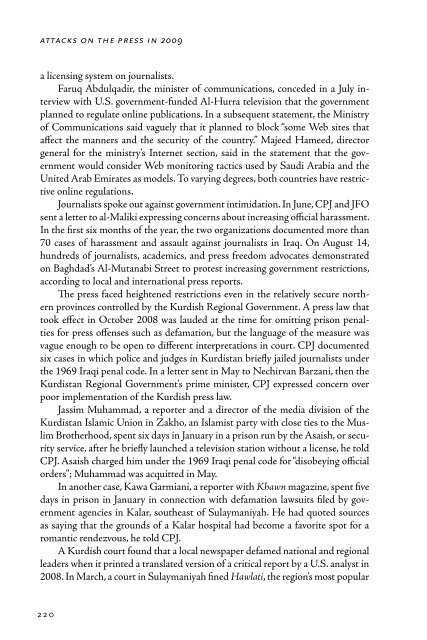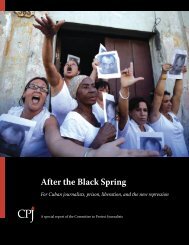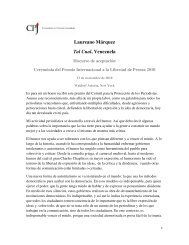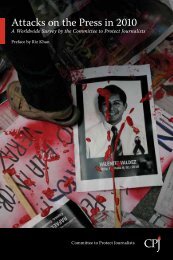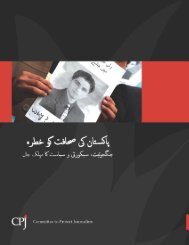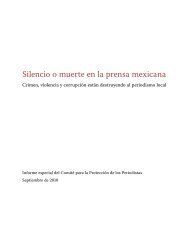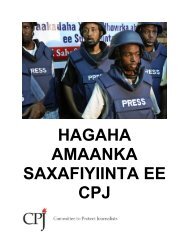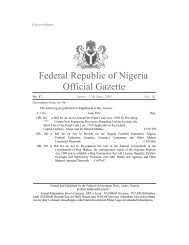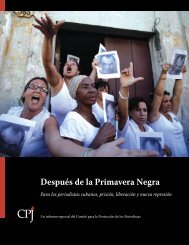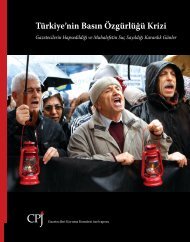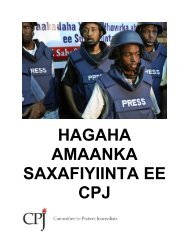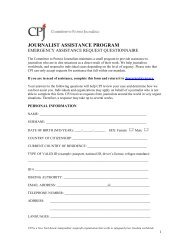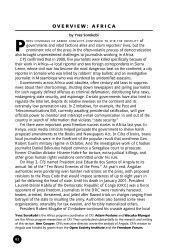Attacks on the Press - Committee to Protect Journalists
Attacks on the Press - Committee to Protect Journalists
Attacks on the Press - Committee to Protect Journalists
- No tags were found...
Create successful ePaper yourself
Turn your PDF publications into a flip-book with our unique Google optimized e-Paper software.
attacks <strong>on</strong> <strong>the</strong> press in 2009middle east and north africa: iraqa licensing system <strong>on</strong> journalists.Faruq Abdulqadir, <strong>the</strong> minister of communicati<strong>on</strong>s, c<strong>on</strong>ceded in a July interviewwith U.S. government-funded Al-Hurra televisi<strong>on</strong> that <strong>the</strong> governmentplanned <strong>to</strong> regulate <strong>on</strong>line publicati<strong>on</strong>s. In a subsequent statement, <strong>the</strong> Ministryof Communicati<strong>on</strong>s said vaguely that it planned <strong>to</strong> block “some Web sites thataffect <strong>the</strong> manners and <strong>the</strong> security of <strong>the</strong> country.” Majeed Hameed, direc<strong>to</strong>rgeneral for <strong>the</strong> ministry’s Internet secti<strong>on</strong>, said in <strong>the</strong> statement that <strong>the</strong> governmentwould c<strong>on</strong>sider Web m<strong>on</strong>i<strong>to</strong>ring tactics used by Saudi Arabia and <strong>the</strong>United Arab Emirates as models. To varying degrees, both countries have restrictive<strong>on</strong>line regulati<strong>on</strong>s.<strong>Journalists</strong> spoke out against government intimidati<strong>on</strong>. In June, CPJ and JFOsent a letter <strong>to</strong> al-Maliki expressing c<strong>on</strong>cerns about increasing official harassment.In <strong>the</strong> first six m<strong>on</strong>ths of <strong>the</strong> year, <strong>the</strong> two organizati<strong>on</strong>s documented more than70 cases of harassment and assault against journalists in Iraq. On August 14,hundreds of journalists, academics, and press freedom advocates dem<strong>on</strong>strated<strong>on</strong> Baghdad’s Al-Mutanabi Street <strong>to</strong> protest increasing government restricti<strong>on</strong>s,according <strong>to</strong> local and internati<strong>on</strong>al press reports.The press faced heightened restricti<strong>on</strong>s even in <strong>the</strong> relatively secure nor<strong>the</strong>rnprovinces c<strong>on</strong>trolled by <strong>the</strong> Kurdish Regi<strong>on</strong>al Government. A press law that<strong>to</strong>ok effect in Oc<strong>to</strong>ber 2008 was lauded at <strong>the</strong> time for omitting pris<strong>on</strong> penaltiesfor press offenses such as defamati<strong>on</strong>, but <strong>the</strong> language of <strong>the</strong> measure wasvague enough <strong>to</strong> be open <strong>to</strong> different interpretati<strong>on</strong>s in court. CPJ documentedsix cases in which police and judges in Kurdistan briefly jailed journalists under<strong>the</strong> 1969 Iraqi penal code. In a letter sent in May <strong>to</strong> Nechirvan Barzani, <strong>the</strong>n <strong>the</strong>Kurdistan Regi<strong>on</strong>al Government’s prime minister, CPJ expressed c<strong>on</strong>cern overpoor implementati<strong>on</strong> of <strong>the</strong> Kurdish press law.Jassim Muhammad, a reporter and a direc<strong>to</strong>r of <strong>the</strong> media divisi<strong>on</strong> of <strong>the</strong>Kurdistan Islamic Uni<strong>on</strong> in Zakho, an Islamist party with close ties <strong>to</strong> <strong>the</strong> MuslimBro<strong>the</strong>rhood, spent six days in January in a pris<strong>on</strong> run by <strong>the</strong> Asaish, or securityservice, after he briefly launched a televisi<strong>on</strong> stati<strong>on</strong> without a license, he <strong>to</strong>ldCPJ. Asaish charged him under <strong>the</strong> 1969 Iraqi penal code for “disobeying officialorders”; Muhammad was acquitted in May.In ano<strong>the</strong>r case, Kawa Garmiani, a reporter with Khawn magazine, spent fivedays in pris<strong>on</strong> in January in c<strong>on</strong>necti<strong>on</strong> with defamati<strong>on</strong> lawsuits filed by governmentagencies in Kalar, sou<strong>the</strong>ast of Sulaymaniyah. He had quoted sourcesas saying that <strong>the</strong> grounds of a Kalar hospital had become a favorite spot for aromantic rendezvous, he <strong>to</strong>ld CPJ.A Kurdish court found that a local newspaper defamed nati<strong>on</strong>al and regi<strong>on</strong>alleaders when it printed a translated versi<strong>on</strong> of a critical report by a U.S. analyst in2008. In March, a court in Sulaymaniyah fined Hawlati, <strong>the</strong> regi<strong>on</strong>’s most popularnewspaper, 10 milli<strong>on</strong> dinars (US$8,653) and Abid Aref, its former edi<strong>to</strong>r, 3 milli<strong>on</strong>dinars (US$2,590). The report, by Michael Rubin of <strong>the</strong> Washingt<strong>on</strong>-basedAmerican Enterprise Institute for Public Policy Research, was highly critical ofIraqi President Jalal Talabani, who also headed <strong>the</strong> Patriotic Uni<strong>on</strong> of Kurdistanparty, and Massoud Barzani, president of Iraqi Kurdistan. Rubin questi<strong>on</strong>ed U.S.strategic relati<strong>on</strong>s with Iraqi Kurdistan, pointing out undemocratic governanceand rampant corrupti<strong>on</strong>.In April, Kurdish regi<strong>on</strong>al authorities charged three people with plotting <strong>to</strong>murder Ahmed Mira, edi<strong>to</strong>r-in-chief of <strong>the</strong> critical Sulaymaniyah-based Livinmagazine, Mira and his lawyer, Othman Sidiq, <strong>to</strong>ld CPJ. The news of <strong>the</strong> plotcame a few m<strong>on</strong>ths after unidentified gunmen killed Soran Mama Hama, a Livinreporter in Kirkuk. In August, a criminal court in Sulaymaniyah found two suspectsguilty of plotting <strong>to</strong> kill Mira and sentenced <strong>the</strong>m <strong>to</strong> six years in pris<strong>on</strong>.One journalist was seriously wounded by U.S. military fire in January. HadilEmad, 25, an edi<strong>to</strong>r for Biladi televisi<strong>on</strong>, was <strong>on</strong> her way home from work whenshe was shot near a checkpoint at Al-Jadriyya Bridge in Baghdad, according <strong>to</strong>local and internati<strong>on</strong>al news reports. A U.S. military statement claimed she had“acted suspiciously.”The U.S. military c<strong>on</strong>tinued <strong>to</strong> hold a freelance pho<strong>to</strong>grapher withoutcharge or due process. Ibrahim Jassam was detained during a September 2008raid at his home in Mahmoodiya, south of Baghdad, according <strong>to</strong> local andinternati<strong>on</strong>al news reports. In November 2008, <strong>the</strong> Iraqi Central CriminalCourt ruled <strong>the</strong>re was no evidence <strong>to</strong> hold Jassam and ordered <strong>the</strong> U.S. military<strong>to</strong> release him. U.S. military authorities rejected <strong>the</strong> court order, sayingthat Jassam “c<strong>on</strong>tinued <strong>to</strong> pose a serious threat <strong>to</strong> <strong>the</strong> security and stability ofIraq.” Chief of Public Affairs Maj. Neal Fisher <strong>to</strong>ld CPJ that Jassam and about15,000 o<strong>the</strong>r detainees would be released in accordance with a “ranking based<strong>on</strong> <strong>the</strong>ir assessed threat” level. CPJ sought Jassam’s release in two letters <strong>to</strong>U.S. President Barack Obama. Over <strong>the</strong> course of <strong>the</strong> war, <strong>the</strong> U.S. militaryhas detained at least 13 journalists for prol<strong>on</strong>ged periods without charge, according<strong>to</strong> CPJ research. All of <strong>the</strong> o<strong>the</strong>rs were released without charges beingsubstantiated.The journalist who caused an internati<strong>on</strong>al spectacle when he threw a pairof shoes at <strong>the</strong>n-U.S. President George W. Bush was c<strong>on</strong>victed of assault againsta public official. Muntadhar al-Zaidi, a corresp<strong>on</strong>dent for Al-Baghdadia satellitetelevisi<strong>on</strong>, was sentenced <strong>to</strong> a <strong>on</strong>e-year pris<strong>on</strong> term in February. Al-Zaidi,who <strong>to</strong>ssed <strong>the</strong> shoes during a December 2008 press c<strong>on</strong>ference, was releasedin September for good behavior. Al-Zaidi <strong>to</strong>ld <strong>the</strong> press that he had sufferedbeatings, whippings, electric shocks, and simulated drowning at <strong>the</strong> hands ofofficials and guards.220221


